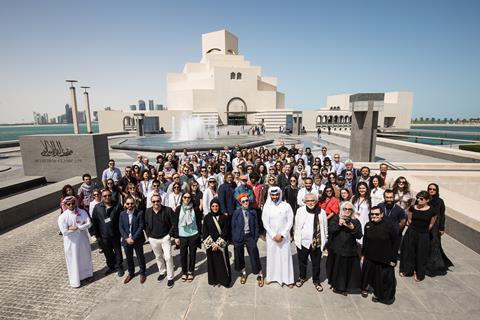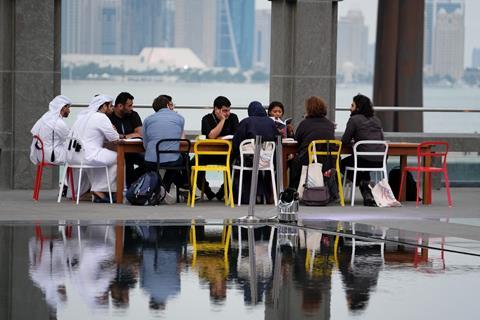
‘Continuity’ is the key word for the Doha Film Institute’s Qumra event as it heads into its 10th edition.
All 10 editions of the regional project incubator have been overseen by the trio of DFI CEO Fatma Al-Remaihi, director of film funding and programmes and Qumra deputy director Hanaa Issa, and DFI artistic advisor Elia Suleiman. This year’s event will host around 200 industry professionals from March 1-6; with another 100 at the online adjunct from March 9-11. “That’s a manageable level, so we can actually remember everyone’s names,” smiles Issa.
Qumra is resurrecting a pre-pandemic tradition for the 2024 meet: the ‘middle dinner’, which bisects the six-day in-person event. Qumra’s first section focuses on mentorship of the 42 selected projects, of which 24 are features. In the second part, project teams meet the industry to pitch their work. “Some people will come for the first half, then leave; then a second batch will come,” says Issa. “In the middle they meet for a big dinner.”
The meal is always hosted at “a place that has a specific meaning to Doha” – which this year will be at Lucia’s Restaurant at the Grand Sheraton Doha, overlooking the city’s bay. “We learned that people like to come together and eat after working hard days,” says Issa of lessons from last year’s in-person return after three online pandemic years. “We’re social creatures.”
Continuity is found in the international guests, who will again include executives from companies including Mubi, mk2 Films and Nordisk Film. Streamers, broadcasters and national and regional fund representatives will gather for relaxed breakfast meetings at the city’s Museum of Islamic Art, before separating into smaller groups for meetings and pitches throughout the day.
Festival programmers also attend from Cannes, Venice, Sundance and Berlin, with Qumra a handy indicator of what is almost ready to launch in the coming year. The buzz at last year’s event was that Amanda Nell Eu’s DFI-backed body horror project Tiger Stripes was headed to the Croisette in a few months – and the film indeed went on to premiere in Cannes Critics’ Week, winning the section’s grand prix and becoming Malaysia’s Oscar entry.
Lina Soualem’s documentary Bye Bye Tiberias, another Qumra 2023 project, launched at Venice’s Giornate degli Autori before heading to Toronto and LFF, and scoring a Film Independent Spirit Awards nomination.
Both titles are back to complete the Qumra circle this year, in the evening screenings of completed, DFI-backed films, with Soualem set to attend her screening on the opening night.
Curated gathering
Qumra’s project selection has always focused emerging filmmakers and this year’s event features more first-time feature directors than ever before. These include France-born Qatari filmmaker Nora Al-Subai, presenting her in-development feature Al-Dana, about a young girl accused of bringing a curse on her village after the disappearance of a famous black pearl.
Al-Subai is already part of the DFI family: her short films My Hero and Al-Johara screened at the Ajyal Youth Film Festival and Ajyal Film Festival in 2013 and 2016 respectively.
The debutants sit alongside those already with international recognition, such as Morocco’s Alaa Eddine Aljem, who returns to Qumra with Eldorado, The Taste Of The South, five years after his debut The Unknown Saint opened in Cannes Critics’ Week. Six projects that have been through long-time Qumra mentor Rithy Panh’s DFI-backed Doc Lab will also be presented.

“A lot of attention goes into that programme,” says Issa. “Every meeting has been analysed across the projects. We’ve had countless calls with all the mentors. We encounter these projects throughout the year – with workshops, not just financial support. It is meticulously curated and nurtured.”
Suleiman highlights Qumra is not a festival event in the mould of Cannes, Venice or Berlin; but rather a “gathering”.
“It’s not a film festival – there’s no competition,” says Suleiman. “The young filmmakers who come to participate in Qumra, it’s only to have this gathering, an entry into cinema. One week of intimate meetings. The idea is to take inspiration from the people here.”
Some things cannot be purchased, he notes. “You can’t buy my love!”
”Qumra builds on the Doha Film Institute’s role as a champion for independent voices that have traditionally been under-represented in world cinema, especially in challenging economies,” says Al-Remaihi.
She believes the event is ”crucial to the success of important voices” from around the world, as it hits the 10-year mark. “We are proud to continue to focus on identifying, developing and strengthening outstanding talent from the Arab world and beyond to create independent cinema with universal resonance.”
Safe haven
The industry in the Middle East and further afield continues to grapple with the ongoing Israel-Hamas conflict. The DFI team say it has had no bearing on their attendance, with executives making the trip from North America, Europe and Asia, and four Palestinian projects participating in this year’s meet.
“There can be intimate discussions between filmmakers who come from different regions,” says Suleiman, who sees Qumra as a safe haven. “I’m sure people are going to express certain emotions. On the other hand, the consolation aspect is important.
“How do you preserve the spiritual component in your life, with the immediacy of the everyday? This retreat can remind oneself of the necessity of being creative and preparing art, and not thinking of the immediate future every day. People go there to embrace this kind of ambiance – this feeling that art can still continue to be something to better our lives.”
Ten editions in, the DFI team retain their infectious enthusiasm for the event. Suleiman is most looking forward to the masterclasses, which this year will be presented by Toni Collette, Claire Denis, Jim Sheridan, Leos Carax, Martin Hernandez and Atom Egoyan. Having taken part in the online-only 2020 event, Denis was keen to participate in-person; while the Collette connection came “through friends of friends” says Issa.
“They’re happy to recommend Qumra and spread the word,” she adds. “They become Qumra ambassadors.”

























No comments yet